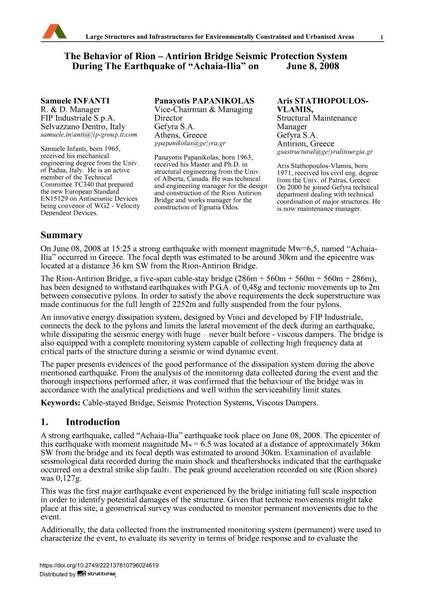The Behavior of Rion - Antirion Bridge Seismic Protection System During the Earthquake of "Achaia-Ilia" on June 8, 2008

|
|
|||||||||||
Bibliographic Details
| Author(s): |
Samuele Infanti
Panayotis Papanikolas Aris Stathopoulos-Vlamis |
||||
|---|---|---|---|---|---|
| Medium: | conference paper | ||||
| Language(s): | English | ||||
| Conference: | IABSE Symposium: Large Structures and Infrastructures for Environmentally Constrained and Urbanised Areas, Venice, Italy, 22-24 September 2010 | ||||
| Published in: | IABSE Symposium Venice 2010 | ||||
|
|||||
| Page(s): | 306-307 | ||||
| Total no. of pages: | 8 | ||||
| Year: | 2010 | ||||
| DOI: | 10.2749/222137810796024619 | ||||
| Abstract: |
On June 08, 2008 at 15:25 a strong earthquake with moment magnitude Mw=6,5, named “Achaia- Ilia” occurred in Greece. The focal depth was estimated to be around 30km and the epicentre was located at a distance 36 km SW from the Rion-Antirion Bridge. The Rion-Antirion Bridge, a five-span cable-stay bridge (286m + 560m + 560m + 560m + 286m), has been designed to withstand earthquakes with P.G.A. of 0,48g and tectonic movements up to 2m between consecutive pylons. In order to satisfy the above requirements the deck superstructure was made continuous for the full length of 2252m and fully suspended from the four pylons. An innovative energy dissipation system, designed by Vinci and developed by FIP Industriale, connects the deck to the pylons and limits the lateral movement of the deck during an earthquake, while dissipating the seismic energy with huge – never built before - viscous dampers. The bridge is also equipped with a complete monitoring system capable of collecting high frequency data at critical parts of the structure during a seismic or wind dynamic event. The paper presents evidences of the good performance of the dissipation system during the above mentioned earthquake. From the analysis of the monitoring data collected during the event and the thorough inspections performed after, it was confirmed that the behaviour of the bridge was in accordance with the analytical predictions and well within the serviceability limit states. |
||||
| Keywords: |
cable-stayed bridge viscous dampers Seismic Protection Systems
|
||||
